Remembering When Pro Surfing Came to Allentown, PA
By Jeff Schuler
The Morning Call
June 23, 2015 at 8:12pm

Michael Ho, of Halei, Hawaii, rides a wave at Dorney Park’s Wildwater Kingdom in 1985 during the world’s first inland surfing contest. Surfers from around the world competed in the World Professional Inland Surfing Championships from June 19-23, 1985, a stop on the World Professional Surfing Championship Tour. (DORNEY PARK, CONTRIBUTED PHOTO)
If everybody had an ocean
Across the USA
Then everybody’d be surfin’
Like Californ-i-a …
In mid-June of 1985, travelers waiting around the baggage carousels of what was then Allentown-Bethlehem-Easton Airport were treated to a somewhat unusual sight for a facility some 100 miles from the nearest beach — surfboards mixed in with their suitcases.
Allentown, or more specifically South Whitehall Township, wasn’t among the surfing hot spots of Southern California and beyond — Pacific Palisades, La Jolla, Waimea Bay, Australia’s Narrabeen — mentioned in the Beach Boys’ mega-hit “Surfin’ U.S.A.” from 1963. But for one week in June, 30 years ago, the Lehigh Valley was the center of attention for the world-wide surfing community.

The scene in the wave pool at the 1985 Inland Surfing Championships
Looking to make a big splash — literally — with its new $10-million Wildwater Kingdom water park, Dorney Park brought in some of the top surfers on the professional circuit for a first-of-its-kind inland surfing competition. The World Professional 1985 Inland Surfing Championships were held June 19-23, just days after the park opened its gates for the first time.
The event lured 70 surfers, including 25 of the world’s top 30, to compete for $25,000 in prize money in one of the 19 stops on the World Professional Surfing Championship Tour, and one of only two in the U.S. (the other was at Huntington Beach, Calif., later that summer).
“Revolutionary is probably an understatement,” Jim Karabasz, a life-long surfing enthusiast who was then Dorney Park’s Director of Surfing, said of the concept.
That gave Bob Plarr an idea.
“He got in touch with me in the fall of 1984, when the pool was barely a hole in the ground, and asked how we could bring surfing to the Lehigh Valley,” said Karabasz, who at the time was working as a salesman for his family’s steel fabricating business in Bethlehem. “He wanted to know who the top guys in the sport were and could I put him in touch with them … he had the guts and foresight to build the pool and to see what could be done with it.”

Karabasz, a 1978 Central Catholic graduate who returned to the school this year as an international business and information technology teacher, began surfing when he was 9 years old and had contacts in the sport.
Karabasz hooked up Plarr with Australian Ian Cairns, the executive director of the Association of Surfing Professionals. Also involved in the discussions were Harris Weinstein, Bob Plarr’s brother-in-law who bought out the Otts after construction began on the water park, and executives from Surf-Tech, the makers of the pool.
Karabasz remembers that “light bulbs” went on all around the room.
“I thought it sounded fantastic for the future of the sport,” Cairns told the Morning Call on the eve of the competition. “We’re taking the sport to the people.”
Cairns envisioned an “inland tour,” which Karabasz said would not only be ideal for spectators but better for TV and business. At televised beach events, Karabasz said, TV crews set up and sometimes have to wait for days for the “best waves” — a waste of time and money.
A wave pool would basically give the surfers a studio, and the audience not only would have a “360-degree view” of the event but better seating and nearby concessions.
“They were really hoping to get something started [inland],” said Karabasz, who made his professional debut (winning $250) as a 25-year-old in the event.
The competition was a clash of cultures. Hotel Americus at 6th and Hamilton in downtown Allentown was the host hotel for the event, and Karabasz remembers getting strange looks from bellhops and even local police as he shuttled surfers and their boards to and from the park.
The setting was just as strange for the competitors.
Tom Curran, a 20-year-old California who was ranked fourth in the world, said at the time it was “alien” to surf “where you can see the mountains in the background.”
“At least there’s no sand to stick in your feet,” observed 20-year-old Japanese surfer Satoshi Sekino.
Top-ranked Tom Carroll, a native of Sydney, Australia, eventually won the event and the $4,500 first-prize money. Many of the other top surfers didn’t fare very well.
“I was beaten by the machinery,” said second-ranked Shaun Thomson of South Africa, who said he had more left-breaking waves than right-breaking ones (his specialty) during his timed session in his third-round loss.
Some also complained about the lack of buoyancy for their boards in fresh water compared to ocean water.
“Some really didn’t apply themselves to the concept,” Karabasz said. “It took surfing down to its basic form. The guy who won was the best wave rider; all the other things that affect you in the ocean were out of the scenario.”
Spectators had to pay the one-day water park admission of $8.85 — the two parks had separate admissions at the time — to watch the competition. According to Karabasz, spectators were standing two-deep around the pool for preliminary action, and were “five or six deep” for the Sunday finals.
Dorney officials told The Morning Call at the time they sold 5,000 admissions for Sunday’s finals
“People drove from Virginia, Florida, all along the Eastern Seaboard to see this,” he said.
Although the tour talked about coming back, it never did. Karabasz said it wasn’t for lack of interest — “They were set to come back,” he said of the surfers.
But hosting the tournament takes one of the park’s biggest draws “out of the loop” for six days.
“The wave pool was a big attraction — you didn’t have to stand in line, you could always go in,” he said. “It was an operational business decision.”
Surfing did continue at the park, however. Karabasz said Wildwater Kingdom did have public surfing twice a day in the pool, and the park also offered surfing lessons.
“There’s a lot of people who surf today that learned in that pool,” he said. “They came from as far away as Michigan to surf and learn in this pool; it was a draw.”
As for Karabasz, he enjoyed a “minor” professional surfing career, and he began a company that rented boogie boards at wave pools all over the country. He sold that business but stayed close to the water by starting Extreme Windsurfing in 1993 near Atlantic City — he also still competes in events and finished third last weekend in a stand-up paddleboard competition in Ventnor, N.J. — and even spent 18 years as a soccer coach in the Lehigh Valley.
Yet his biggest claim to fame might be that week in 1985 at Wildwater Kingdom
“Everybody in surfing knows me from that competition,” he said. “It’s ‘Hey, that’s Jim Karabasz, he’s the guy that did that surfing thing in Pennsylvania a while back.’ I was in Indonesia one time and a guy learned my name and said, ‘You’re the guy … I know you.'”
.… Everybody’s gone surfin’
Surfin’ USA
Read the original 1985 Inland Surfing Championships article on The Morning Call
Jeff.schuler@mcall.com
Twitter @jschulermc



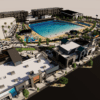
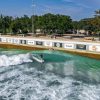
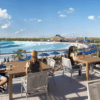
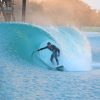
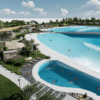

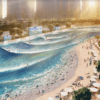

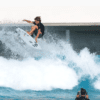
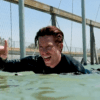
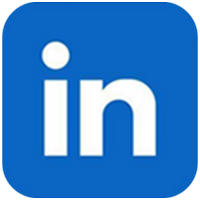
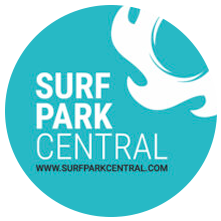


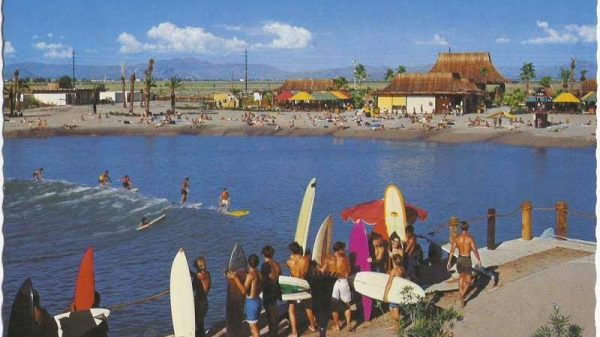
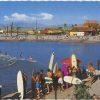
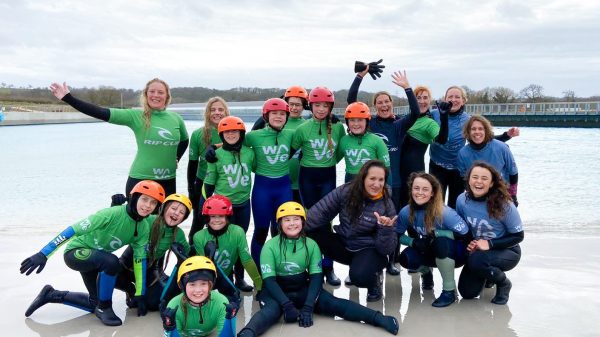
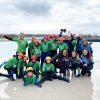
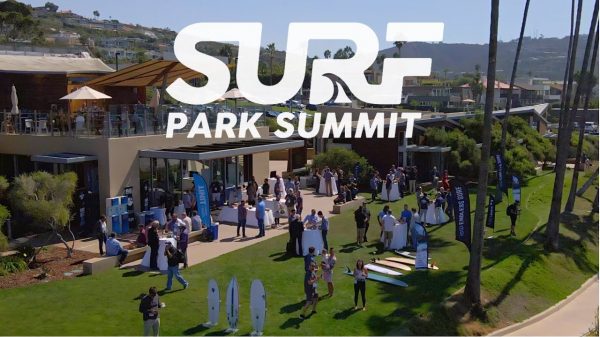
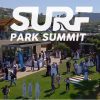
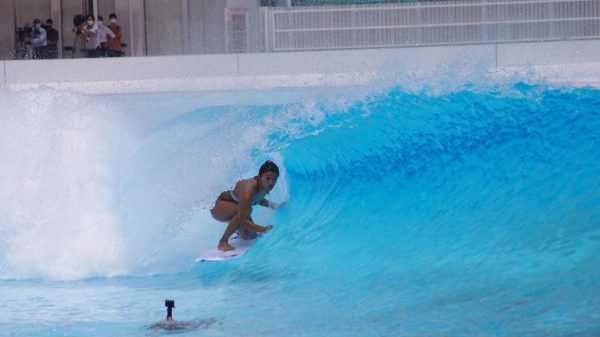
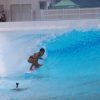
You must be logged in to post a comment Login